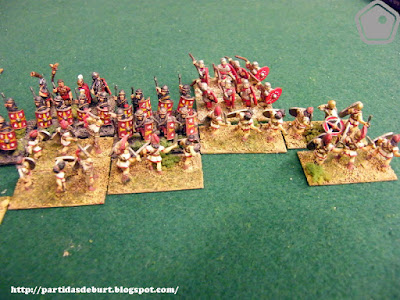Juego / Game: FoW Napoleonic
Temática / Thematic: Napoleonic
Escala
/ Scale: 15mm
Fecha
/ Date: 26/11/2014
Lugar
/ Location: Infernal Forge
Jugadores
/ Gamers:
Ejército Francés / French Army: Strategus
Ejército
Aliado / Allied Army: Burt Minorrot
European Alliance Vs France
En
esta ocasión estuve en una partida en la que me ensañaron a jugar a FoW
Napoleónico.
Era
una partida Random, en la que por un lado estaba un conjunto de unidades de
diferentes países europeos.
This time I was in a game in which they taught me to play Napoleonic
FoW.
It was a Random game, in which on the one hand there was a set of units
from different European countries.
Y su
marcador de objetivo.
And your objective marker.
Y frente a
este, uno del Imperio francés.
And in front of this, one of the French Empire.
Y el
objetivo francés marcado desde el principio.
And the French goal marked from the beginning.
Nada más
empezar la partida, la caballería aliada, intentan avanzar para flanquear por
la izquierda a los hombres de Napoleón.
As soon as the game begins, the allied cavalry, try to advance to flank
on the left the men of Napoleon.
Y posicionan
en el centro a su artillería.
And they position their artillery in the center.
Y la
artillería francesa se prepara para los ataques “contrabatería”.
And the French artillery is preparing for the
"counter-battery" attacks.
El avance
aliado, por los flancos, parece bien coordinado.
The Allied advance, on the flanks, seems well coordinated.
Ante este
empuje, los franceses maniobran para prepararse para no ser cogidos por la
tenaza que inician los aliados.
Faced with this push, the French maneuver to prepare not to be caught by
the pincer that the allies start.
Y el avance
por el centro, de los aliados, no se hace esperar.
And the advance through the center, of the allies, does not wait.
Las
maniobras francesas desbaratan el flanqueo aliado por la derecha, aunque por la
izquierda, a través del bosque, las tropas avanzan sin problema alguno.
The French maneuvers disrupt the allied flank on the right, although on
the left, through the forest, the troops advance without problem.
Mientras la caballería
aliada, consigue hacerse con el flanco izquierdo, aún en proceso de
construcción por parte de los franceses.
While the allied cavalry, it manages to take control of the left flank,
still under construction by the French.
El franco
derecho acaba siendo prácticamente francés.
The right franc ends up being practically French.
Y el flanco izquierdo
tiene pinta de ser de los aliados.
And the left flank looks like it belongs to the allies.
En el
centro, las tropas francesas no lo tienen del todo claro.
In the center, the French troops are not entirely clear.
Y en el
flanco izquierdo, la caballería aliada, diezma a la infantería francesa.
And on the left flank, the Allied cavalry, decimates the French
infantry.
Al final los
aliados llegan a su objetivo.
In the end the allies reach their objectives.
Y consiguen
retomar el flanco derecho.
And they manage to retake the right flank.
Triunfo
total de los aliados.
Total triumph of the allies.
En resume.
Ya he
comentado en más de una ocasión que la época napoleónica no es de mis
favoritas, aunque he jugado muchas partidas de ella.
Este juego
es muy Flames (evidentemente), por lo que es muy rápido, y cuando una de las
facciones empieza a flaquear, es muy rápido su eliminación.
No es un
juego para muchas florituras románticas de estrategias y tácitcas. Está
diseñado para torneos rápidos, como el juego de 2GM, por lo que la sensación
histórica luce por su ausencia.
Para los que
les guste partidas de un par de horas, que empiecen y terminen, este es su
juego.
Aun habiendo
ganado, me ha dejado un mal sabor de boca. Es la sensación de jugar a un juego
con escusa napoleónica, pero que perfectamente podría ser otro ejército de otra
época.
Para los que
buscamos un poco más el símil con lo histórico, mejor buscar otro. Yo me quedo
con Shakó II.
In summary.
I have already commented on more than one occasion that the Napoleonic
era is not my favorite, although I have played many games of it.
This game is very Flames (evidently), so it is very fast, and when one
of the factions begins to waver, its elimination is very fast.
It is not a game for many romantic flourishes of strategies and tactics.
It is designed for fast tournaments, like the 2GM game, so the historical
sensation looks for its absence.
For those who like games of a couple of hours, which start and end, this
is your game.
Even having won, it has left a bad taste in my mouth. It is the feeling of playing a game with Napoleonic excuse, but that could perfectly well be another army from another era.
For those of us who seek a bit more the simile with the historical,
better to look for another one. I stay with Shako II.
Burt
Minorrot













































